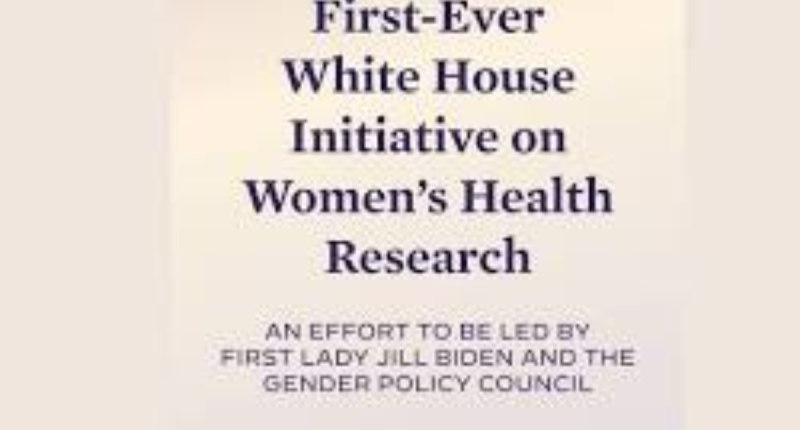Biden Health Initiative For Women – The Biden administration has unveiled a groundbreaking initiative aimed at revolutionizing women’s healthcare through targeted research and innovative strategies.

This comprehensive effort, led by First Lady Jill Biden, seeks to address the unique health challenges faced by women and narrow the gender disparities that persist in the healthcare system.
Women are disproportionately affected by mental health issues, with an anxiety disorder or depression diagnosis twice as common among women as among men. Furthermore, women are far more likely to develop autoimmune diseases, with nearly 80% of Sjogren’s syndrome and lupus diagnoses occurring in females. Additionally, women may experience heart attack symptoms differently than men, potentially delaying appropriate treatment in the emergency room.
Reports indicate that female patients often feel overlooked or dismissed by healthcare providers, with their concerns not taken seriously.
Addressing The Gap In Women’s Health Research
Women make up over half of the world’s population yet remain understudied and underrepresented in health research. This lack of focus on women’s health issues has led to significant gaps in knowledge, hindering the development of effective prevention, diagnosis, and treatment strategies.
The Biden administration’s initiative aims to bridge this research gap by investing in studies that specifically focus on women’s health concerns. This includes research on conditions such as:
Heart disease: Women often experience heart attack symptoms differently than men, which can lead to delayed diagnosis and treatment.
Autoimmune diseases: Women are disproportionately affected by autoimmune diseases, such as lupus and Sjogren’s syndrome.
Mental health: Women are twice as likely to experience an anxiety disorder or depression than men.
Pain: Women are more likely to experience chronic pain than men, and their pain is often underdiagnosed and undertreated.
By expanding our understanding of these conditions, researchers can develop more tailored and effective interventions for women.
Biden Health Initiative For Women – Promoting Gender-Sensitive Healthcare
The initiative also seeks to promote gender-sensitive healthcare practices that recognize the unique needs of women. This includes:
Training healthcare providers: Healthcare providers need to be educated about the distinct symptoms, risk factors, and treatment needs of women.
Improving data collection: Currently, much of the health data collected is sex-blind, making it difficult to identify and address gender disparities.
Addressing unconscious bias: Healthcare providers may have unconscious biases that can affect their diagnosis and treatment decisions.
By addressing these issues, the initiative aims to create a healthcare system that is more equitable and effective for all women.
Empowering Women in Their Healthcare
The initiative also aims to empower women to take control of their health. This includes:
Promoting self-advocacy: Women need to feel comfortable talking to their healthcare providers about their concerns.
Increasing access to information: Women need to have access to accurate and up-to-date information about their health.
Supporting community-based initiatives: Community-based organizations can play a vital role in educating and empowering women about their health.
By empowering women to take charge of their health, the initiative can lead to improved health outcomes for all women.
A Collaborative Effort for Improved Women’s Health
The Biden administration’s initiative is a collaborative effort that brings together researchers, healthcare providers, policymakers, and community organizations. This collaboration will be essential to ensuring that the initiative is successful in achieving its goals.
Despite these distinctions, there is a dearth of research on women’s health, and women are underrepresented in scientific studies. For example, women’s health research received just 10.8% of the NIH’s 2020 budget.
But on November 13, President Biden unveiled a ground-breaking program to address the disparities in women’s health and close this research gap.
First Lady Jill Biden will serve as the initiative’s leader, and prominent figure in women’s health research Carolyn Mazure, Ph.D., will serve as chair. Mazure will oversee the Gender Policy Council and the Office of the First Lady’s Initiative.
By funding studies that optimize the nation’s capacity to prevent, identify, and treat health issues in women, the Initiative seeks to close the disparity.
In particular, the Initiative will bring together federal agencies, private sector scientists, and research institutions to develop and suggest policies that the Biden-Harris Administration can implement to address health disparities and enhance women’s health.
It will also identify which health issues impact women the most and invest in research addressing those areas.
The Initiative also aims to identify ways to raise public awareness of the research gap and assess opportunities for women to be recruited, trained, and supported in careers in biomedical and health research.
Within 45 days, members of the initiative will start recommending things to the Biden administration.
“Every woman I know has a story about leaving her doctor’s office with more questions than answers,” First Lady Jill Biden said in a White House statement. It’s not that our doctors are hiding information; rather, the issue is that not enough research has been done to determine the most effective ways to diagnose, treat, and manage even common women’s health issues. That is not acceptable in 2023.”
Biden Initiative For Women – Aim and Benefits of the Initiative
Aim: To enhance women’s health outcomes through increased women-focused scientific research and the identification of effective strategies.
Benefits:
Women will reap numerous benefits from this groundbreaking initiative, including:
Improved understanding of women’s health: The initiative will promote comprehensive research on women’s specific health issues, shedding light on the unique factors that contribute to their health concerns. This enhanced knowledge will empower researchers, healthcare providers, and policymakers to develop more effective and targeted interventions.
Tailored healthcare approaches: By understanding the gender-specific aspects of women’s health, the initiative will facilitate the development of tailored strategies and interventions that address their unique needs and risk factors. This personalized approach will lead to more effective prevention, diagnosis, and treatment of women’s health conditions.
Enhanced healthcare provider awareness: Healthcare providers will gain valuable insights into the distinct symptoms, risk factors, and treatment needs of women. This improved awareness will ensure that women’s concerns are adequately addressed, preventing misdiagnoses and ensuring timely access to appropriate care.
Empowered women in healthcare: The initiative will promote women’s self-advocacy and engagement in their healthcare decisions. By fostering informed choices and empowering women to take control of their health, the initiative will contribute to improved health outcomes and overall well-being.
Reduced health disparities: By addressing the unique challenges and needs of women, the initiative will help to bridge the gender gap in healthcare. This will lead to a more equitable and effective healthcare system that serves all women effectively.
Overall, the initiative strives to establish a comprehensive and evidence-based approach to women’s health, addressing the disparities and gaps that currently exist, and ultimately improving the quality of life for women worldwide.









